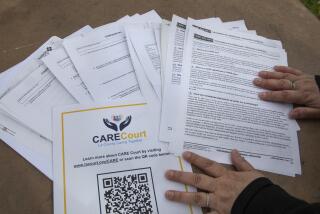The Courts Have Let AIDS Patient Down, but Life Hasn’t
- Share via
Randi Weber’s home, for now, overlooks the ocean in San Clemente. Sitting on her front deck, she can almost inhale its power, briny and furious, and command it to soothe, command it to heal. Almost, but not quite.
“This is a healing process, out there,” Randi Weber says, her arm gesturing wide, toward the sea. “I can see it in my mind, which is even better than with my eyes.
“I am not ashamed of what’s wrong with me,” she goes on. “If I did not have that blood transfusion in ‘83, I wouldn’t be alive, and that is the only way I can look at it.”
The transfusion, at a military hospital in Colorado, gave Randi the virus that causes AIDS. She was undergoing surgery on a malignant brain tumor at the time. Both breasts and her uterus had been removed years before.
Randi is 39 years old, a registered nurse, now legally blind.
She has already planned her own celebratory memorial service; it may come soon. Her many friends will be there, those who have cared for her, those who have listened to her “vent.” She is close to God, overjoyed with life and unafraid of death.
“I know what it will be like,” she says. “There is going to be a light at the end of the tunnel. When that call comes from the end of the tunnel, it is going to be like a ride at Disneyland.”
Here Randi makes a sound, whoosh. Her hand juts out in front of her. She pictures herself being whisked away.
“And there will be no more pain and there is going to be a man with a white robe on and he is going to say, ‘Yup, you made it.’ ”
The vision settles over Randi Weber’s face, which is thin and unadorned, framed by dark blond waves. Her smile turns wide.
Anger, throughout our long talk, never appears. This woman doesn’t seem much for tears. Only the mention of her 17-year-old daughter, who has run away to Florida, strung out on drugs, makes her lower lip quiver and her eyes glisten in pain.
“Some days do frighten me,” she says. “They are almost too painful to bear. But I will never give up on life, because this is a gift to me, being here. Since I can’t help patients now, maybe I can help by talking to people.”
That is why Randi Weber called me.
The court system, Randi believes, has done her wrong. And she is too weak, and too poor, to fight with more than words. She thinks that others--women and men--may be similarly abused. All in the name of an “equitable” divorce.
Randi’s second husband, a major in the Marines, surprised her with divorce papers not long after she was told she has the AIDS virus. He began to beat her, too. A police report, and Randi’s scars, bear this out. The court eventually ordered him to keep away from Randi and her daughter, whom he also allegedly abused.
“He told me that I cheated him,” Randi says. “I was a healthy, viable woman and I cheated him by getting sick. He was really a great person--understanding, very loving--until I got sick.”
The couple were married 6 1/2 years.
Randi had thought that things would eventually settle down. She thought her husband’s violence was simply a reaction to the terrifying specter of AIDS. He told her not to talk about her illness; she thought that would change. It did not.
When Randi sought, and received, help from the military, she says, her husband became enraged. He felt that she was sabotaging his career. His commanders ordered him to stay away from her and later transferred him to the East Coast.
He has been passed over for promotion three times. In two more years, he will have been in the Marines for 20 years. By then, he must get out.
The divorce settlement was handed down in June. It appears pretty standard, as long as you don’t consider the particulars of this case.
He was ordered to pay spousal support. She is granted the right to live in the house, which is jointly owned, until he retires from the military, most likely within two years. She must pay him a form of rent.
Moreover, the mortgage, insurance, taxes and the other household incidentals fall to her. If she cannot pay, the house reverts to him alone.
All of which might not have been so bad if divorce agreements were always followed in good faith, if divorcing spouses always got along and if time were available to work out any kinks. None of that applies here.
Randi’s husband, the court acknowledged, hasn’t paid her before. She says he isn’t paying what he owes her now. So the money she needs just isn’t there. She is afraid of losing her home.
Although the military pays her medical bills, and a friend lives with her to help with her care, Randi’s Social Security disability payment does not stretch very far.
This is from Superior Court Judge William Froeberg’s memorandum of decision that finalized Randi’s divorce:
“In recent months, the respondent’s T-4 cells have begun a rapid decline leading to a chronic wasting away. She is subject to seizures from a brain tumor, chronic diarrhea and weight loss. Respondent’s chances of living beyond the next two years is 20% or less. . . . Although respondent is in a downhill slide, she can remain somewhat stable if she minimizes the stress in her life.”
This is an irony whose cruelty Randi cannot understand. The stress of not knowing how she will pay her bills is already taking its toll on her health. Her doctor, at the Navy hospital in San Diego, says her T-cells are down another hundred as of last week. He is prescribing yet more drugs.
“All I wanted was the house,” Randi says. “He can have everything else. All I wanted was to live in the house and this sounds morbid, but to die in my house.
“The ocean has always been a healing process for me,” she says once again. “It washes in the good and washes out the bad. I do have a dream. If I can’t stay here in the house, then fine. Let the court order this sold and split. I want to go ahead and do that. I’d buy a boat and live on the ocean. It would have enough room on the outside for a wheelchair hoist and a walker. . . . “
Randi’s voice trails off. She knows this is unlikely to happen. The judge has ruled. Appeals take money and time, far too much of both.
Still, Randi smiles. It is for her health. She doesn’t want to squander this gift of life. She says she feels better after we talk. It is the only way that she can think of to fight back.


